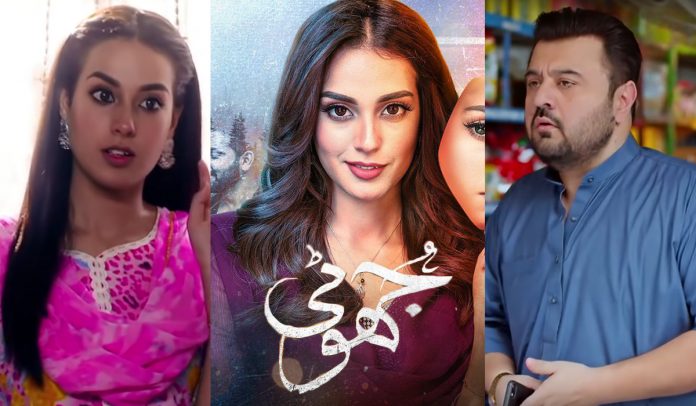The much-anticipated television show Jhooti starring Iqra Aziz Hussain, Ahmed Ali Butt and Yasir Hussain finally took to the airwaves last week. The television serial had grabbed headlines earlier when its provocative teasers received flak for seemingly tone-deaf content that trivializes domestic abuse against women. Many media commentators called out the drama’s team for maligning women and justifying misogyny, putting the show in the spotlight.
Written by Ali Moeen, Jhooti is about a woman who is a compulsive liar. The serial’s pilot episode gave us a sneak peek into the world of its titular character Nirma (Iqra Aziz) who is a compulsive liar — and also an ambitious girl who would go to any extent in order to get what she wants.
Nirma dreams of a rich life and wants to live her life on her terms. The character seems to have a wicked streak, even going as far as conning her own family without an iota of guilt. Ahmed Ali Butt plays her obsessed lover who is desperate to marry her even if he has to sacrifice all his assets. The supporting cast features names such as Tauqeer Nasir, Shaista Jabeen, Asma Abbas and Madiha Rizvi.
First Impressions
From the very first scene, we get a glimpse of Nirma’s obsession to be rich and successful. She even tells her mother that it will be a sin if she dies poor. During these initial reels, we are also introduced to other important cast members, primarily the families of Nirma and Nasir (Ahmed Ali Butt) and Nirma’s friend, Samina who encourages her to be a rebel.
Nirma turns out to be quite a spoilt brat (or so the show would have us believe), as despite her middle-class upbringing we see her drinking and partying in a shady party set-up with some unpleasant camera work.
That all of this adds to the script’s overall problematic tone is unfortunate — it is surely disappointing to see how partying culture is depicted in our television plays, and Jhooti decidedly sticks to the societal stereotypes. Moreover, why does a woman who is ambitious and has dreams always have to be shown as indulging in morally compromising activities? The gender politics regarding consuming alcohol is also regressive and a tad misogynistic. With the female protagonist being the most problematic character throws any kind of relatability for the show out of the window.
Despite these glaring shortcomings, Jhooti has an engaging screenplay; the scenes are short and crisp, and the editing is sharp. Multiple location changes make the viewing experience refreshing since the narrative is not limited to the four walls of a house. The art direction also adds much to the viewing experience.
Problematic Writing
Noor Mahal famed Ali Moeen manages to write an engaging narrative that has undertones of patriarchal social commentary, reflected in some of the key dialogues. In one of the scenes Samina tells Nirma that “Agar tumhe aag lagani hai to pehle tumhe khud aag bana hoga.” This is a multi-layered dialogue which reflects several patriarchal norms, and also encourages such reprehensible behavior.
In one of the scenes Nirma is seen fretting over her cousin’s wedding, she is shown getting angry for the reason that the “ugly lady” got a good spouse. She goes on to add a few derogatory adjectives such as “Gol Muun, Pakora naak” for the lady in question. Setting beauty standards and deeming certain facial features undesirable should be a definite “no” for prime-time television.
In another scene, Samina tells Nirma that she doesn’t know how to use her beauty, in the context of wooing men for financial benefits (“Tumhe khoobsurati ko cash nahi karna aata”). These dialogues objectify women and play into the same patriarchal standards that see women being dependent on men for a better living standard.
In a confrontational between Nirma and her brother Majid, the former refuses to get married as she wants to explore different spectrums of her life, however, her brother shouts at her and taunts by saying if she wants to join modeling. Why do writers paint their own fraternity in a negative shade? This profession is still discussed with a negative connotation which is disappointing.
Performances
Iqra Aziz is actually quite good as Nirma. The actress has gotten into the skin of her character who deals with compulsive lying. The actress should be appreciated for not making this character a caricature or outright negative. Her little nuances in scenes with her friend show her vulnerable side and her insecurities. The actress lets her eyes do the talking and uses her vocal tone to express aggression and anger instead of going overboard with her expressions.
Ahmed Ali Butt makes you feel for him. The actor has layered his character with innocence and charm to curb his comic aura. He also elevates the humor element in an otherwise dramatic narrative. Veterans Asma Abbas and Shaista Jabeen bring their A-game to the forefront. Other cast members provide ample support. Yasir Hussain’s character will make an entry in the upcoming episodes, who plays a con man and will make Nirma taste the dose of her own medicine.
Final Verdict
Jhooti has a compelling screenplay but the writing has problems with misogynistic dialogues that hamper the entertainment factor of the play. It would not be surprising if Nirma’s character arc takes the same course as Meray Paas Tum Ho’s Mehwish, who also happened to be a negative gold digger through most of the show. Coming back to the play, Iqra Aziz and Ahmed Ali Butt’s performances are pretty much the redeeming factors so far.
Upcoming episodes will reveal more about Nirma’s plans and will also mark the entry of Yasir Hussain’s character, Ali, which will make the narrative exciting. We will be following the show to see how it charts its course through some misogynistic themes.




